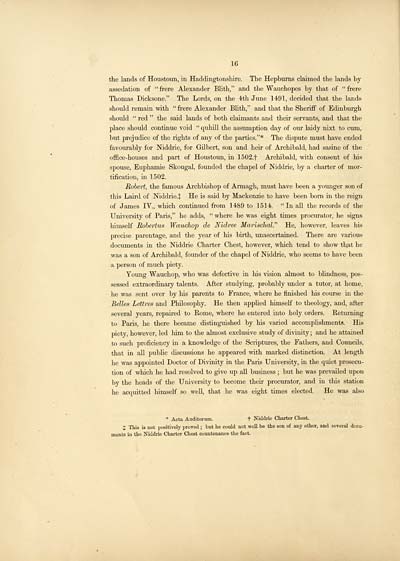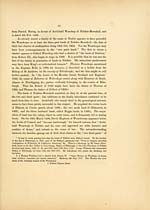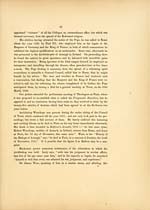Download files
Complete book:
Individual page:
Thumbnail gallery: Grid view | List view

16
the lands of Houstoun, in Haddingtonshire. The Hepburns claimed the lands by
assedation of " frere Alexander Blith," and the Wauchopes by that of " frere
Thomas Dicksone." The Lords, on the 4th June 1491, decided that the lands
should remain with " frere Alexander Blith," and that the Sheriff of Edinburgh
should " red " the said lands of both claimants and their servants, and that the
place should continue void " quhill the assumption day of our laidy nixt to cum,
but prejudice of the rights of any of the parties."* The dispute must have ended
favourably for Niddrie, for Gilbert, son and heir of Archibald, had sasine of the
office-houses and part of Houstoun, in 1502.f Archibald, with consent of his
spouse, Euphamie Skougal, founded the chapel of Niddrie, by a charter of mor-
tification, in 1502.
Robert, the famous Archbishop of Armagh, must have been a younger son of
this Laird of Niddrie.J He is said by Mackenzie to have been born in the reign
of James IV., which continued from 1489 to 1514. " In all the records of the
University of Paris," he adds, " where he was eight times procurator, he signs
himself Robertus Wauchop de Nidree Marischal." He, however, leaves his
precise parentage, and the year of his birth, unascertained. There are various
documents in the Niddrie Charter Chest, however, which tend to show that he
was a son of Archibald, founder of the chapel of Niddrie, who seems to have been
a person of much piety.
Young Wauchop, who was defective in his vision almost to blindness, pos-
sessed extraordinary talents. After studying, probably under a tutor, at home,
he was sent over by his parents to France, where he finished his course in the
Belles Lettres and Philosophy. He then applied himself to theology, and, after
several years, repaired to Rome, where he entered into holy orders. Returning
to Paris, he there became distinguished by his varied accomplishments. His
piety, however, led him to the almost exclusive study of divinity ; and he attained
to such proficiency in a knowledge of the Scriptures, the Fathers, and Councils,
that in all public discussions he appeared with marked distinction. At length
he was appointed Doctor of Divinity in the Paris University, in the quiet prosecu-
tion of which he had resolved to give up all business ; but he was prevailed upon
by the heads of the University to become their procurator, and in this station
he acquitted himself so well, that he was eight times elected. He was also
* Acta Auditorum. t Niddrie Charter Chest.
J This is not positively proved ; but he could not well be the son of any other, and several docu-
ments in the Niddrie Charter Chest countenance the fact.
the lands of Houstoun, in Haddingtonshire. The Hepburns claimed the lands by
assedation of " frere Alexander Blith," and the Wauchopes by that of " frere
Thomas Dicksone." The Lords, on the 4th June 1491, decided that the lands
should remain with " frere Alexander Blith," and that the Sheriff of Edinburgh
should " red " the said lands of both claimants and their servants, and that the
place should continue void " quhill the assumption day of our laidy nixt to cum,
but prejudice of the rights of any of the parties."* The dispute must have ended
favourably for Niddrie, for Gilbert, son and heir of Archibald, had sasine of the
office-houses and part of Houstoun, in 1502.f Archibald, with consent of his
spouse, Euphamie Skougal, founded the chapel of Niddrie, by a charter of mor-
tification, in 1502.
Robert, the famous Archbishop of Armagh, must have been a younger son of
this Laird of Niddrie.J He is said by Mackenzie to have been born in the reign
of James IV., which continued from 1489 to 1514. " In all the records of the
University of Paris," he adds, " where he was eight times procurator, he signs
himself Robertus Wauchop de Nidree Marischal." He, however, leaves his
precise parentage, and the year of his birth, unascertained. There are various
documents in the Niddrie Charter Chest, however, which tend to show that he
was a son of Archibald, founder of the chapel of Niddrie, who seems to have been
a person of much piety.
Young Wauchop, who was defective in his vision almost to blindness, pos-
sessed extraordinary talents. After studying, probably under a tutor, at home,
he was sent over by his parents to France, where he finished his course in the
Belles Lettres and Philosophy. He then applied himself to theology, and, after
several years, repaired to Rome, where he entered into holy orders. Returning
to Paris, he there became distinguished by his varied accomplishments. His
piety, however, led him to the almost exclusive study of divinity ; and he attained
to such proficiency in a knowledge of the Scriptures, the Fathers, and Councils,
that in all public discussions he appeared with marked distinction. At length
he was appointed Doctor of Divinity in the Paris University, in the quiet prosecu-
tion of which he had resolved to give up all business ; but he was prevailed upon
by the heads of the University to become their procurator, and in this station
he acquitted himself so well, that he was eight times elected. He was also
* Acta Auditorum. t Niddrie Charter Chest.
J This is not positively proved ; but he could not well be the son of any other, and several docu-
ments in the Niddrie Charter Chest countenance the fact.
Set display mode to:
![]() Universal Viewer |
Universal Viewer | ![]() Mirador |
Large image | Transcription
Mirador |
Large image | Transcription
Images and transcriptions on this page, including medium image downloads, may be used under the Creative Commons Attribution 4.0 International Licence unless otherwise stated. ![]()
| Histories of Scottish families > History and genealogy of the family of Wauchope of Niddrie-Merschell > (24) Page 16 |
|---|
| Permanent URL | https://digital.nls.uk/95384595 |
|---|
| Description | A selection of almost 400 printed items relating to the history of Scottish families, mostly dating from the 19th and early 20th centuries. Includes memoirs, genealogies and clan histories, with a few produced by emigrant families. The earliest family history goes back to AD 916. |
|---|

